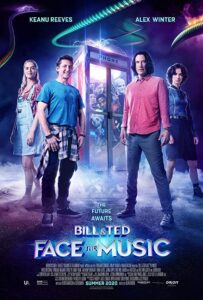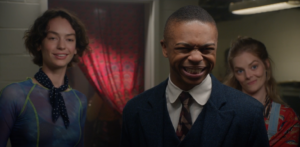“Be excellent to each other.”
This especially relevant phrase was coined by one Bill S. Preston Esq. in 1989’s “Bill & Ted’s Excellent Adventure.”
Now, 25 years later, Bill and Ted are back to face their destiny.
“Bill & Ted Face the Music” was released for Video on Demand and received a limited theater release Aug. 28.
After their 25 year-long hiatus, Bill Preston (Alex Winter) and Ted Logan’s (Keanu Reeves) band Wyld Stallyns are still struggling in 2020 to create a song prophesied to unite humanity and bring world peace.
Desperate to live up to their destiny, the duo have resorted to producing experimental music tracks, trying anything and everything to create the fateful song, like throat singing combined with trumpet and xylophone instrumentals.
As the Wyld Stallyns struggle to write the song, the future comes calling on the duo again, this time in the form of Kelly (Kristen Schall), the daughter of Rufus (George Carlin), their time traveling mentor from the first two films.
Once again brought to the future, Bill and Ted are informed that they have until 7:17 p.m. on the very day they left to write and perform the song.
However, this time the duo are informed that rather than just world peace being at stake, the entirety of reality is running the risk of collapsing as different time periods begin to fold in on one another.
Struggling to write the song, Bill and Ted steal their old phone booth time machine to travel to the future and take the song from the future versions of themselves who have already written the song.
While a more convoluted plot than the first two films, it still relies on the basic prophecy of “Bill & Ted’s Excellent Adventure.”
Performance wise, “Face the Music” is all over the place in terms of acting quality. Alex Winter as Bill certainly carries the duo’s scenes on his shoulders, feeling exactly like an older version of Bill.
Keanu Reeves as Ted, on the other hand, provides a stilted and strained performance. This doesn’t feel to be a result of a lack of acting prowess, but rather because Reeves has taken on more serious and sophisticated roles since the last film. Rather than seeming like his old goofy, air-headed self, Ted feels like a suburban dad stuck using 80’s slang for no particular reason.
Ironically, the performances of Billie and Thea, the daughters of Bill and Ted face the opposite issue. Billie (Brigette Lundy-Paine), Ted’s daughter, encompasses the original personality and attitude of Ted perfectly, replicating Reeve’s delightful teenage performance.

Conversely, Thea (Samara Weaving), Bill’s daughter does not carry the same charm and lovable dimwittedness of her father, with her performance feeling blank next to Billie. Samara Weaving tries to replicate Bill’s mannerisms, but isn’t given enough time outside of plot-critical scenes to truly shine; a disappointment given Weaving’s acting prowess in the past.
Thea and Billie also give other cast members a chance to shine as they travel in their own time machine to gather historical musicians to help Bill and Ted perform the song of their destiny, recreating a plot similar to that of “Excellent Adventure.” Members that stand out among the gathered band include Jeremiah Craft as Louis Armstrong and DazMann Still as Jimi Hendrix.
Not only is the plot more convoluted, but it completely throws the rules of time travel established in the previous films out the proverbial window. In one scene, the 2025 version of Ted’s father is killed and sent to Hell, but when brought back to life with the rest of the crew near the climax of the film, he is with them in 2020.
Just like the cast performances, the musical composition of the film can be hit and miss.
There are high points in the films musical scenes, such as the song played by the Wyld Stallyns in the beginning of the film and a piano versus guitar duel between Jimi Hendrix and Mozart.
The lows are certainly low, though. The song that’s supposed to unite the world, “Face the Music” is a bland, instrumental that isn’t particularly compelling. As music has always been a big part of the “Bill & Ted” franchise, this is most disappointing, especially since the world-uniting song was always something that was never shown before in the previous films.
In the moment, “Face the Music” seems powerful at the emotional climax of the film, but upon reflection, it is for sure the weakest of the Stallyns’ performances. However, the twist at the end of how the song is composed and who the composers are was a pleasant surprise, but is easily guessable.
There is nothing in particular that makes this film stand out in the trilogy, other than the continuation of the story. Aside from the mixed performances in acting and music, the directing composition is nothing to write home about either when compared to “Bogus Journey’s” experimental, artistic film direction.
Altogether, “Bill and Ted Face the Music” is certainly lackluster to those who have been waiting with high hopes for the past 25 years. This doesn’t mean the film doesn’t have its own merits, but viewers shouldn’t go into the film expecting a revolutionary new installment in the franchise.
Rather, viewers should simply expect a silly, lighthearted continuation of Bill and Ted’s story that exists for the fans and tries its hardest despite its flaws.

